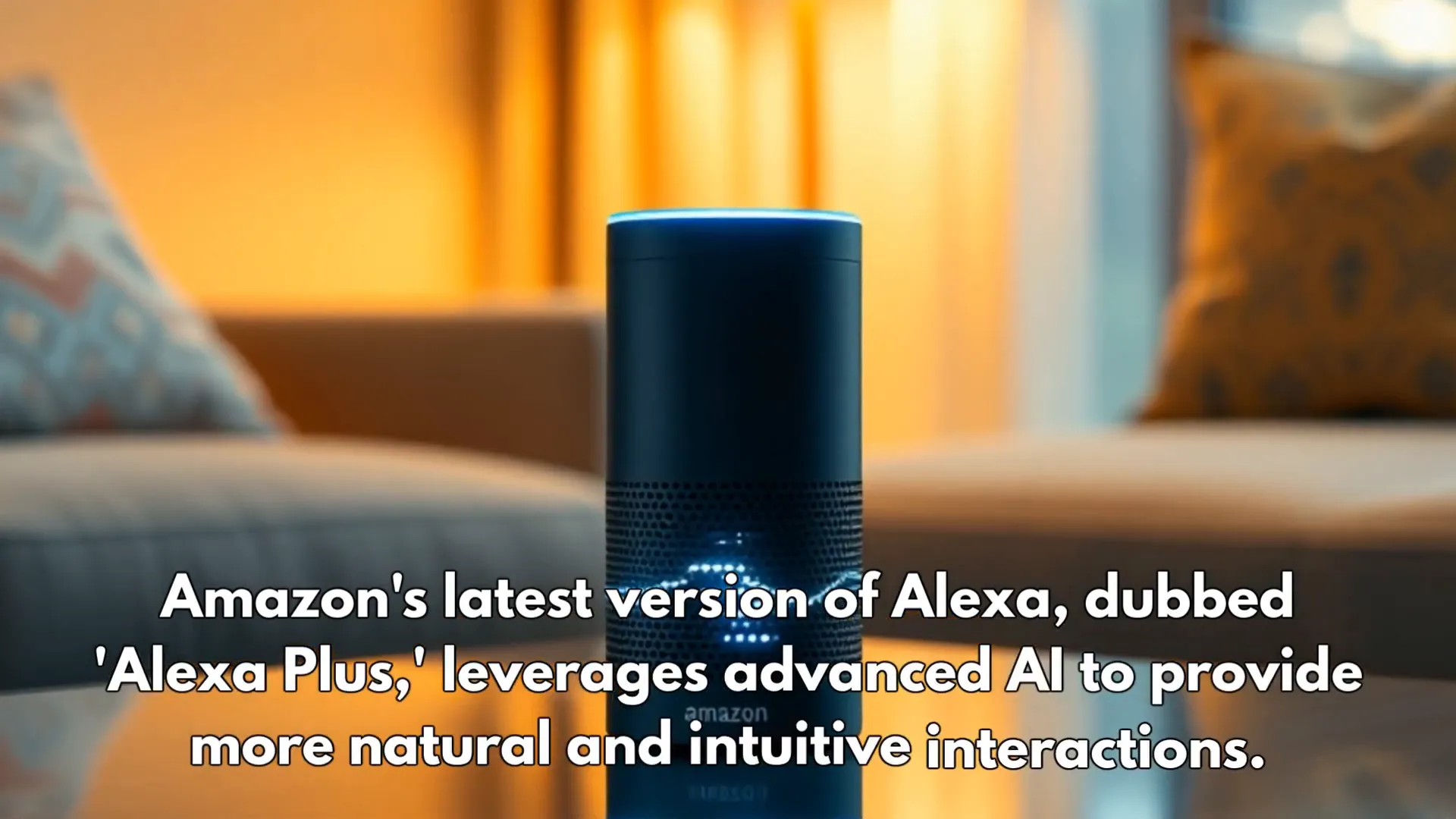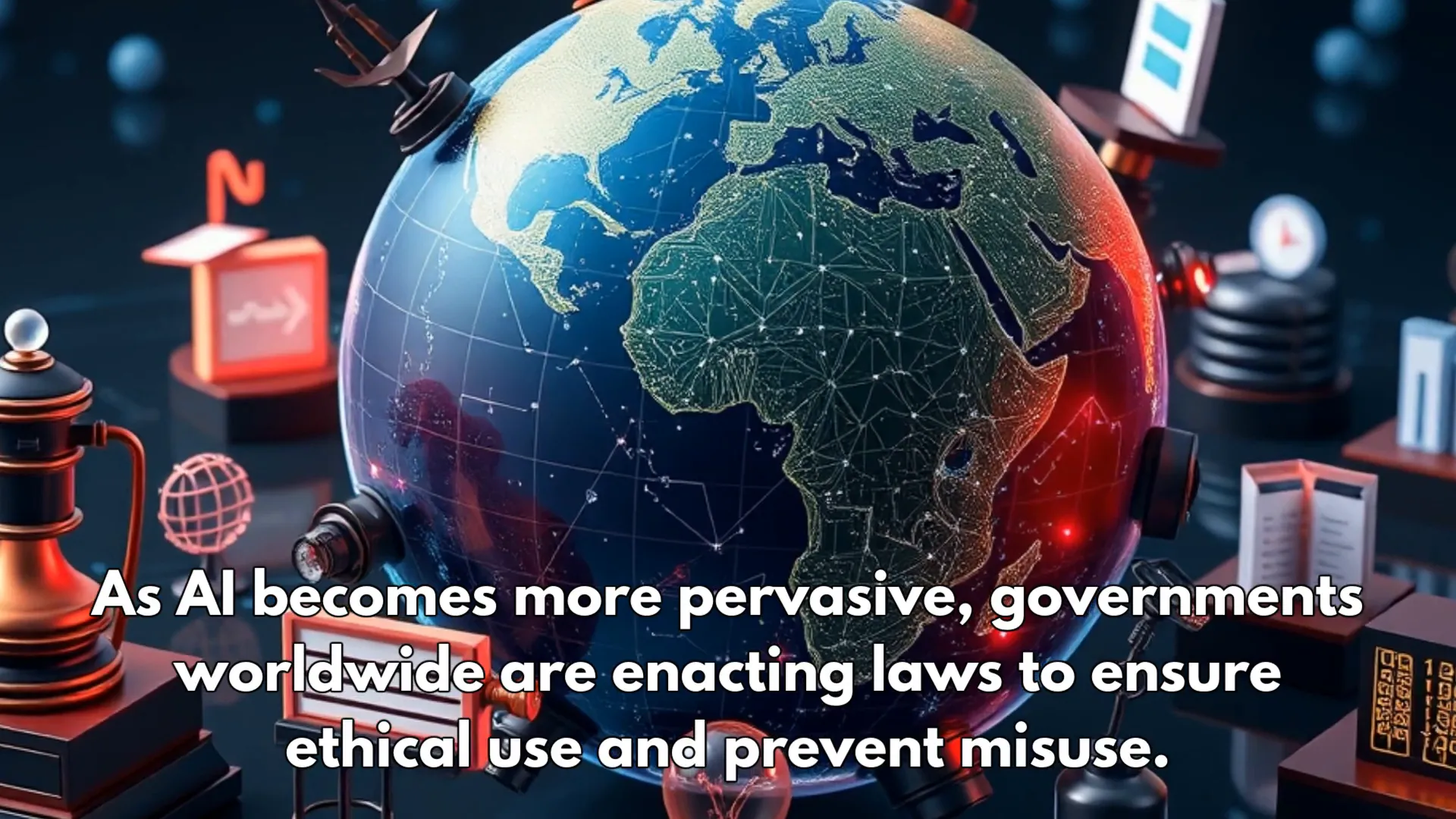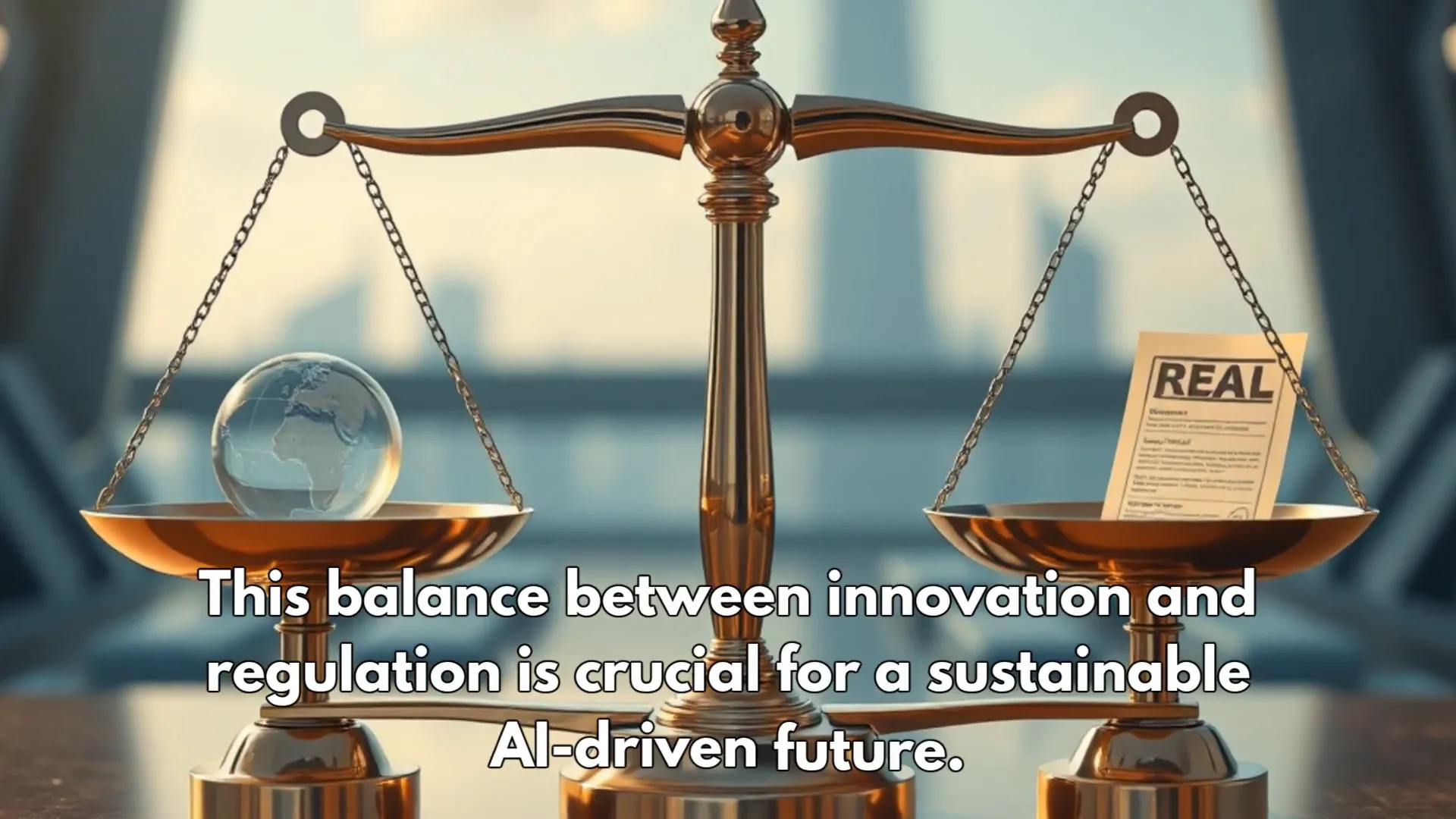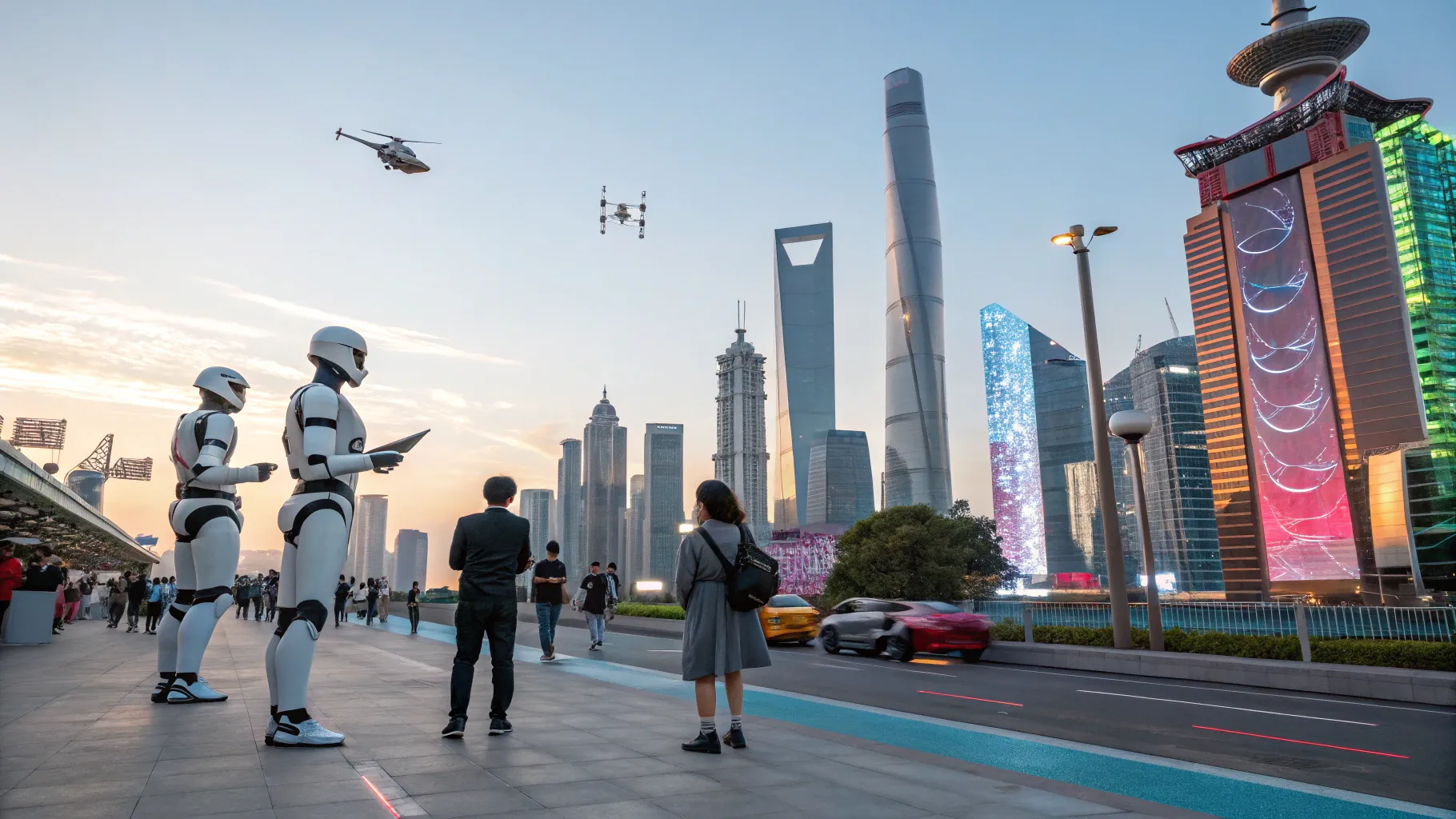As we venture into 2025, the landscape of artificial intelligence is rapidly evolving. In this blog, we will explore the top five AI innovations that promise to reshape our lives, from generative AI in software development to humanoid robots assisting in our homes. Join us as we delve into how these advancements are setting the stage for a revolutionary future.
Table of Contents
- 🚀 Introduction to AI Innovations in 2025
- ⚖️ AI Legislation and Ethics
- 🤝 Engaging with the AI Community
- 🔍 Recap of AI Innovations Shaping 2025
- 💭 Your Thoughts on AI Innovations
- ❓ FAQ: What are the top AI innovations to watch?
🚀 Introduction to AI Innovations in 2025
As we stand on the brink of a new era, AI innovations in 2025 are set to redefine our daily experiences. These advancements are not just theoretical; they are tangible changes that will impact how we work, live, and interact with technology. From improving efficiency in software development to creating robots that feel like part of the family, the future is bright with possibilities.
Imagine a world where machines understand and anticipate our needs. This is the essence of the innovations we are witnessing today. With AI becoming more integrated into our lives, we are not just passive consumers of technology; we are active participants in shaping its evolution.
Let’s dive deeper into some of the most exciting developments on the horizon.
💻 Generative AI in Software Development
Generative AI is revolutionizing the software development landscape. Traditionally, coding has been a labor-intensive process, requiring developers to write, debug, and optimize code manually. However, in 2025, AI innovations in this field will allow systems to autonomously generate code, significantly reducing development time.
Imagine AI tools that not only write code but also learn from past projects, improving their outputs over time. This technology will enable developers to focus on higher-level design and architecture rather than getting bogged down in repetitive tasks. The result? Faster project delivery and increased productivity.
- AI-driven code generation tools will assist developers in creating complex applications with minimal input.
- Automated debugging processes will identify and fix bugs in real-time, enhancing software reliability.
- Collaborative AI systems will allow teams to work together seamlessly, regardless of geographical barriers.

🤖 Humanoid Robots Entering Our Homes
With companies like Figure AI leading the charge, humanoid robots are becoming an integral part of our domestic lives. These robots are designed to assist with everyday chores, making our lives more convenient and freeing up time for more meaningful activities.
Picture a world where a robot chef prepares dinner while you unwind after a long day. Or a mechanical butler that tidies up your living space without you lifting a finger. This isn’t just a futuristic fantasy; it’s happening right now. The technology is advancing rapidly, making these intelligent helpers more accessible than ever before.
- Humanoid robots can perform a variety of tasks, from cleaning to cooking, tailored to individual household needs.
- These robots are equipped with advanced AI, enabling them to learn preferences and adapt to family routines.
- As they become more common, humanoid robots will change the way we think about household management.

🌐 The Decentralization of AI Platforms
The shift towards decentralization in AI platforms marks a significant milestone in the industry. Companies like Deep Seeker are pioneering open-source AI models, making advanced technology accessible to everyone.
This democratization of AI fosters innovation and collaboration across the globe. It encourages developers, researchers, and enthusiasts to contribute to and enhance existing models, leading to rapid advancements in the field. The power of AI is no longer confined to large corporations; it’s in the hands of the people.
- Open-source platforms allow for collective problem-solving and innovation.
- Access to sophisticated AI tools can empower startups and small businesses, leveling the playing field.
- Decentralization fosters a culture of transparency and ethical AI development.
🗣️ Advancements in Virtual Assistants
Virtual assistants are evolving beyond basic commands and responses. The latest advancements in AI, such as Amazon’s Alexa Plus, are setting new standards for how we interact with technology. These systems are becoming more intuitive, understanding context and nuances in human speech.
With enhanced capabilities, virtual assistants will not only manage tasks but also engage in meaningful conversations. They will learn from our behaviors and preferences, creating a personalized experience that feels almost human.
- Advanced natural language processing enables virtual assistants to hold conversations that feel natural and engaging.
- Integration with smart home devices allows for seamless control of our living environments.
- These assistants will anticipate needs, providing proactive suggestions and solutions.

⚖️ AI Legislation and Ethics
As AI technologies become increasingly integrated into our daily lives, the conversation around AI legislation and ethics is more critical than ever. Governments worldwide are grappling with the complexities of regulating these powerful tools without stifling innovation. It’s a delicate balance that requires thoughtful consideration and proactive measures.
Legislators are now focusing on creating frameworks that ensure ethical use while addressing potential risks. This includes data privacy, algorithmic bias, and accountability in AI decision-making processes. The goal is to protect individuals and society at large while fostering an environment where AI can thrive.
- New regulations are being crafted to prevent misuse of AI technologies.
- Ethical guidelines are being developed to ensure fair treatment and transparency.
- Collaboration between tech companies and lawmakers is essential for effective policy-making.

📊 The Importance of Balancing Innovation and Regulation
Finding the right equilibrium between fostering innovation and implementing regulation is paramount. While regulations are necessary to safeguard against abuses, overly stringent laws can hinder creativity and progress. The challenge lies in crafting policies that adapt to the rapid pace of technological change.
Stakeholders, including tech companies, policymakers, and ethicists, must engage in ongoing dialogue to navigate these waters. This collaboration can lead to solutions that protect public interests while allowing innovators to explore new horizons. The future of AI depends on this balance.
- Innovation thrives in environments where risks are managed but not overly restricted.
- Adaptive regulations can evolve alongside technological advancements.
- Public trust is built through transparency and ethical practices in AI development.

🧠 The Fusion of Technology and Human Ingenuity
The intersection of technology and human creativity is where the magic happens. As AI systems become more sophisticated, they are not just tools but collaborators in innovation. This fusion is enabling breakthroughs that were once thought impossible, pushing the boundaries of what we can achieve.
In 2025, we will witness AI assisting in creative processes, from art and music to scientific research and problem-solving. These technologies will augment human capabilities, leading to remarkable outcomes that combine the best of both worlds. The synergy between AI and human ingenuity is reshaping industries and redefining success.
- AI can analyze vast datasets, providing insights that inspire new ideas.
- Creative professionals are leveraging AI to enhance their work and explore new styles.
- The collaboration between humans and AI will drive unprecedented innovation.

🌟 Exciting Future Possibilities
Looking ahead, the future possibilities with AI innovations in 2025 are nothing short of exhilarating. We are on the cusp of a technological renaissance where AI will play a pivotal role in addressing global challenges. Whether it’s climate change, healthcare, or education, AI has the potential to revolutionize our approach to these pressing issues.
Imagine AI systems that can predict natural disasters, optimize energy consumption, or personalize learning experiences for students. The implications are vast, and the opportunities for positive impact are limitless. As we embrace these advancements, we must remain mindful of their ethical implications and strive for inclusive progress.
- AI-driven solutions could lead to sustainable practices in various industries.
- Healthcare advancements through AI can improve patient outcomes and accessibility.
- Education can become more tailored and effective with AI integration.

📰 Staying Updated with AI Innovations
In a rapidly evolving field like AI, staying informed is crucial. The pace of innovation means that what’s cutting-edge today may become commonplace tomorrow. Engaging with the latest research, news, and developments is essential for anyone interested in the future of technology.
Follow reputable sources, participate in discussions, and attend conferences to keep your finger on the pulse of AI advancements. By staying updated, you can better understand the implications of these technologies and contribute meaningfully to the conversation about their future.
- Subscribe to AI-focused publications and newsletters.
- Join online communities and forums dedicated to AI discussions.
- Participate in webinars and workshops to expand your knowledge.

🤝 Engaging with the AI Community
Engagement within the AI community is crucial for fostering innovation and collaboration. As enthusiasts and professionals, we must actively participate in discussions, share insights, and support one another in navigating the complexities of AI advancements. This community is not just about technology; it’s about people who are passionate about shaping the future.
Joining forums, attending meetups, and participating in online platforms can significantly enhance your understanding. By connecting with like-minded individuals, you can share experiences, learn from diverse perspectives, and contribute to the collective knowledge base.
- Participate in online forums and discussions to exchange ideas and best practices.
- Attend AI conferences and workshops to network and gain insights from industry leaders.
- Follow and engage with thought leaders on social media platforms to stay informed.
🔍 Recap of AI Innovations Shaping 2025
As we reflect on the groundbreaking AI innovations in 2025, it’s clear that the landscape is changing rapidly. Each advancement brings unique opportunities and challenges, shaping our interactions with technology and each other. Let’s recap some of the most significant trends:
- Generative AI: Revolutionizing software development by automating code generation and debugging.
- Humanoid Robots: Enhancing daily life with robots that assist in household chores.
- Decentralization: Promoting open-source AI platforms that democratize access to technology.
- Virtual Assistants: Becoming more intuitive, providing personalized interactions and support.
- AI Legislation: Ensuring ethical practices and balancing innovation with regulation.
💭 Your Thoughts on AI Innovations
We want to hear from you! Your insights and opinions matter in this rapidly evolving field. What excites you the most about AI innovations in 2025? How do you envision these technologies impacting your life or industry? Engaging in this conversation can inspire new ideas and collaborations.
Consider sharing your thoughts in the comments section below. Whether you’re a seasoned professional or a curious newcomer, your perspective is valuable. Let’s create a dialogue that fosters understanding and encourages further exploration of these innovations.
❓ FAQ: What are the top AI innovations to watch?
As we navigate through the advancements in AI, many are curious about the innovations that hold the most promise. Here are some frequently asked questions regarding the top AI innovations to watch in 2025:
- What is generative AI, and why is it important? Generative AI refers to systems that can create content, such as code, images, or text, autonomously. Its importance lies in its ability to streamline processes and enhance creativity, allowing for faster and more efficient project completion.
- How are humanoid robots changing our daily lives? Humanoid robots are designed to assist with everyday tasks, making lives more convenient. They can perform chores, provide companionship, and adapt to household routines, transforming our interactions with technology.
- What role does decentralization play in AI? Decentralization promotes open-source AI models, making advanced technology accessible to a broader audience. This shift encourages collaboration and innovation, breaking down barriers traditionally held by large corporations.
- How are virtual assistants evolving? Virtual assistants are becoming more intuitive, leveraging advanced AI to understand context and nuances in communication. This evolution enables them to provide personalized experiences, enhancing user interaction.
- What are the ethical considerations surrounding AI? As AI technologies proliferate, ethical considerations such as data privacy, algorithmic bias, and accountability become paramount. Balancing innovation with regulation is essential to ensure a sustainable future.


Leave a Reply